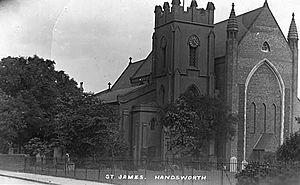St James' Church, Handsworth facts for kids
Quick facts for kids St James' Church, Handsworth |
|
|---|---|

Postcard of St James' Church, before the new chancel was built in 1878
|
|
| 52°30′19″N 1°56′54″W / 52.5052°N 1.9484°W | |
| Denomination | Church of England |
| Churchmanship | Liberal High Church |
| Administration | |
| Parish | St James |
| Diocese | Birmingham |
St James' Church is a historic Anglican church located in Handsworth, Birmingham, England. It was built between 1838 and 1840. The land for the church was generously donated by John Crockett, who owned the nearby New Inns Hotel.
Contents
The Church's Design and Changes
The first architect for St James' Church was Robert Ebbles from Wolverhampton. He was known for designing churches in the Gothic Revival style, which brought back medieval architectural looks.
How the Church Grew Over Time
The church building has changed quite a bit since it was first built.
- In 1878, a new part called a "chancel" was added. This is the area around the altar.
- Then, in 1895, the church was rebuilt again. This time, the designs were by J. A. Chatwin.
- During this rebuilding, the original chancel became the north chapel.
- The original main part of the church, called the nave, became the north aisle.
- The tower on the west side was renamed the north-west tower.
- New sections were added, including a new chancel, a larger nave, and a south aisle.
- Chatwin used red brick in a style called "Decorated," which looked different from the original stone parts of the church. The original parts were in an "Early English" style.
The Church's Parish and Community
A "parish" is the area that a church serves. St James' Church got its own parish in 1854. This area was created from parts of the parish of Saint Mary's Church.
Changes to the Parish Area
Over the years, parts of St James' parish were used to create new parishes for other churches:
- In 1907, some land went to form part of the parish for St Peter's Church.
- In 1914, another section became part of the parish for St. Andrew's Church.
Notable People Connected to St James'
Many interesting people have been part of St James' Church.
- From 1883, the vicar (the main priest) was the Reverend Thomas Smith Cave.
- A famous composer named Theodore Stephen Tearne was the organist at the church from 1904 to 1908. He later moved to Australia.
- The well-known singer Leslie Webster Booth was a chorister (a choir member) at the church from 1909 to 1911. He later became a chorister at Lincoln Cathedral.
Church Records and Archives
The church keeps important records of its history.
- Early records of baptisms (christenings), marriages, and burials are stored safely.
- Minutes from parish meetings are also kept.
- These valuable documents can be found in the archives at the Library of Birmingham.
St James' Church Today
As of August 2025, the vicar of St James' Church is the Reverend Dr David Isiorho. He used to work as a social worker. He is also part of the team that edits a journal called Black Theology.
Worship and Location
The church follows a "Liberal High Church" tradition for its worship services. This means their services have a formal style with traditional elements. St James' Church is located on the corner of Saint James Road and Crocketts Road. It is just off the main A41 Holyhead Road. The church is part of the Anglican Diocese of Birmingham.
 | Anna J. Cooper |
 | Mary McLeod Bethune |
 | Lillie Mae Bradford |

